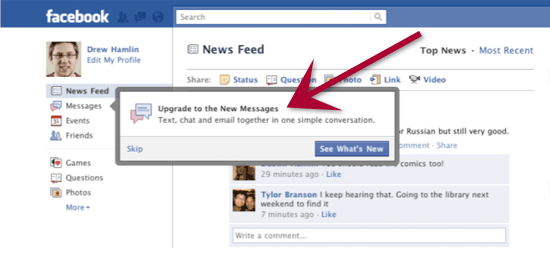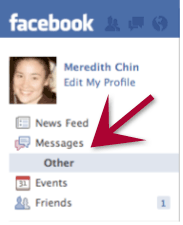Review courtesy Search Engine Land
At one end of the spectrum, Facebook says it’s “simple” and “fun.” On the other end, some are saying it’s Facebook’s version of Google Wave. And just about everyone spent the weekend suggesting that it’s a “Gmail killer.”
“It” is Facebook’s new,
Whatever-you-do-don’t-call-it-email-but-hey-here’s-a-Facebook-email-address-for-you email and messaging system. Facebook
says it’s more like chat; and it’s definitely not an email killer.
Who’s right? We’ll all decide that collectively as the invites get sent out. Until then, here’s how Facebook’s new Messages system works, via a screenshot-filled PDF distributed at today’s news conference.
How Do I Get The New Facebook Messages?
The new Messages is being rolled out “gradually,” as in over several months. Facebook users can
request an invite and cross their fingers. When you’re in, you’ll see a pop-up window like this:
Clicking on that “See What’s New” button will take you to another page where you can review the basics of the new Messages and confirm that you want it.
How Do I Get A Facebook Email Address?
Once you’ve received your invite and confirmed that you want the new Messages system, Facebook will invite you to claim your Facebook.com email address. It’ll match your current Facebook username. (If you don’t have one of those, you can get one at the same time.)
After I’m In, How Does The New Messages Work?
One of the immediate changes you’ll notice after you start using the new Facebook Messages is the naming of your inboxes/folders. Rather than the current “messages” and “updates” naming scheme, the new Messages just uses “messages” and “other.” You’ll first see the “Messages” box, and that’s where Facebook says it’ll prioritize all the messages from your friends. Everything else gets sent to the “other” folder — that includes messages from Facebook Groups and from Pages that you’ve liked.
Another big change is the integration of messages into one system. If you have a Facebook.com email and use Facebook’s chat tool, all of this comes together the way Facebook wants. If you provide your phone number, you can bring SMS messages into the system, too. This screenshot shows how messages will appear in both the main in box and in Facebook Chat, and you can reply from either interface:
As you can see on that image, there’s also a new tool to include attachments with messages. (see the small icon on the far left below “Write a reply…”)
And, yes, there’s a search element here, too. Facebook says it has “revamped” how message search works. You can search for either the person you were chatting with or for the topics you were talking about. You can also add people to conversations, remove yourself, or forward conversations to others.
Is Facebook Messages Private?
There are a number of Q&As related to privacy in the
Facebook help topic for the new Messages system. By default, anyone on Facebook can still send you a message and, if you get a Facebook.com email address, anyone else with an email address can email you if they know your Facebook.com address. But you can change that via the privacy settings for your Facebook account; the options for who can send you messages are “everyone,” “friends,” and “friends of friends.”
You can also choose who to share your Facebook.com email address with, but keep in mind that any thinking person will know that your email address is the same as your Facebook username.
What If My Friends Don’t Have It Yet?
Once you’re in the new Messages system, you’ll have a number of invites that you can share with friends. Just like, errrr … Gmail.









